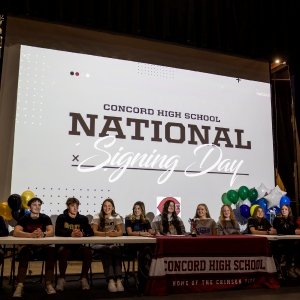ACLU argues “Keep New England White” banner hung on highway overpass is protected speech

Members of NSC-131, a neo-Nazi group in New England, protest story hour outside Teatotaller cafe in downtown Concord. Jacqueline Cole
| Published: 05-10-2024 2:45 PM |
To the ACLU of New Hampshire the phrase “Keep New England White” is a racist and detestable statement that signals to people of color that they are not welcome here. It’s also protected speech under the First Amendment.
In a “friends-of-the-court” brief filed this week, the ACLU challenged the New Attorney General’s civil actions brought against NSC-131, a white supremacist group, after they hung a banner from a highway overpass in Portsmouth that read “Keep New England White.”
“While the ACLU and ACLU-NH find NSC-131’s mission, goals, and tactics to be abhorrent and diametrically opposed to our mission and values, we are gravely concerned that an unfavorable court decision in this case will chip away at the free speech rights of all of us,” said Devon Chaffee, executive director of the ACLU of New Hampshire in a statement.
The case would set a precedent by allowing the government to suppress viewpoints and target groups “they don’t like” with charges of trespassing, Chaffee continued.
“According to the Superior Court, the Attorney General Office’s interpretation of the statute would empower the state to punish any number of expressive activities on public property that are abstractly ‘motivated by’ race, religion, or any other protected characteristic, including, for example, a Black Lives Matter protest on a public street, a demonstration to ‘save Chinatown,’ an abortion protest on the State House lawn, or the proselytization of a particular religion,” the ACLU stated.
The New Hampshire Attorney General’s office filed civil charges against the white supremacist group and two of its leaders, Christopher Hood and Leo Anthony Cullinan, who died in June, for trespassing to hang the banner, noting that the message came from a place of racial prejudice.
However, Rockingham Superior Court Judge David Ruoff dismissed the case, stating that the defendants’ actions were protected by free speech. The Attorney General’s office has appealed the decision to the state Supreme Court.
In a statement, Attorney General John Formella expressed his disappointment in the ACLU’s brief and reaffirmed that NSC-131 is accused of trespassing to hang the banner.
Article continues after...
Yesterday's Most Read Articles
 Casella Waste Systems’ landfill project in New Hampshire’s North Country denied permit
Casella Waste Systems’ landfill project in New Hampshire’s North Country denied permit
 ‘Less finger pointing, more communication’: Longtime Chichester residents share hopes before second town meeting
‘Less finger pointing, more communication’: Longtime Chichester residents share hopes before second town meeting
 ‘The revenue just isn’t there’: House Finance Committee slashes $271M in jobs, services from Ayotte’s budget proposal
‘The revenue just isn’t there’: House Finance Committee slashes $271M in jobs, services from Ayotte’s budget proposal
 12 Concord student-athletes sign on to play at the collegiate level
12 Concord student-athletes sign on to play at the collegiate level
 ‘There was no oversight’: NH child advocate has been a watchdog for children's care. Now, the office is on the chopping block
‘There was no oversight’: NH child advocate has been a watchdog for children's care. Now, the office is on the chopping block
 Volunteer group wants to help homeless clean up their camp
Volunteer group wants to help homeless clean up their camp
“It is a violation of the New Hampshire Civil Rights Act to commit a trespass motivated by race,” he said. “Any failure to enforce our Civil Rights Act in the face of these unlawful acts would send a message to marginalized communities that New Hampshire law enforcement will not take the necessary steps to protect them.”
He criticized the ACLU for defending white supremacists.
“I am disappointed that the ACLU has chosen to support an organized hate group such as NSC-131,” Formella said. “Hate has no place in New Hampshire, and we will not sit idly by while organized hate groups like NSC-131 commit illegal acts for the purpose of harassing and even terrorizing our citizens.”
The ACLU said it expressly does not “condone the speech used in this case and are committed to actively fighting white supremacy across the country. The organizations are proud of the work they do to counter racism and white supremacy, and collaborate closely alongside other organizations in the state and country who do this difficult and important work.”
In June, NSC-131 protested a drag queen story hour outside of Teatotaller in Concord. A group of men with hats and masks stood outside the glass windows of the cafe with a banner that read “defend white communities.”
Six months later, the Attorney General’s office charged Hood and 19 unidentified members of the group with an attempt to coerce the cafe to engage in unlawful discrimination by canceling their event.
A key distinction between the demonstration outside of Teatotaller and the Portsmouth banner was the group’s intent to disrupt the drag queen story hour, prosecutors said.
“They’re shouting into a cafe, chanting into the cafe, banging on the glass of the cafe and essentially invading the space attempting to disrupt and prevent what is happening,” said Sean Locke, the Assistant Attorney General Director in the Civil Rights Unit in an interview in December. “That is, for our purposes, an important distinction.”
With the overpass banner, the Attorney General’s Office suggests members of NSC-131 were “motivated by race” to trespass and deliver their message.
In its 29-page filing, the ACLU references a dozen New Hampshire Supreme U.S. Supreme Court cases to bolster its argument and urge the court to uphold the case’s dismissal.
“The allegations provide no plausible basis to infer that Defendants engaged in discriminatory targeting of anyone when they trespassed on public property by affixing two banners to a fence on a public highway overpass,” the brief states.







 Henniker ponders what is a ‘need’ and what is a ‘want’
Henniker ponders what is a ‘need’ and what is a ‘want’ Boscawen residents vote to fund major renovation of public works building
Boscawen residents vote to fund major renovation of public works building ‘Voting our wallets’: Loudon residents vote overwhelmingly against $1.7M bond for new fire truck
‘Voting our wallets’: Loudon residents vote overwhelmingly against $1.7M bond for new fire truck In Pembroke, Education Freedom Accounts draw debate, voters pass budget
In Pembroke, Education Freedom Accounts draw debate, voters pass budget
